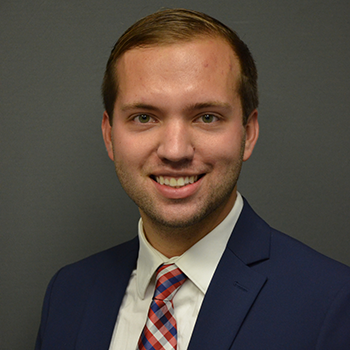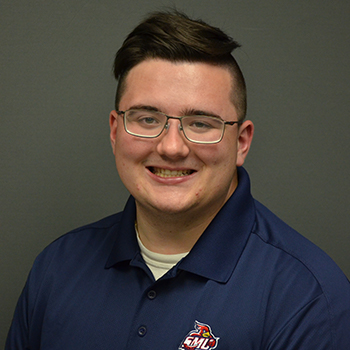Not only do Saint Mary’s University students excel as leaders on campus, they also represent the university well in state and national roles.
Using their leadership skills, as well as their strong ethical values, these students embody the mission of the university as they help bring about changes and events that more broadly benefit students beyond Saint Mary’s.
Two examples include Johnathon Krull, who serves as the chair of the Minnesota Association for Private College Students (MAPCS), and Elijah Williams, who has sat on two national committees for the American Physician Scientist Association. At Saint Mary’s, both students serve on the student senate, with Williams serving as president and Krull serving as vice president of public affairs.
Krull and MAPCS
As the chair of MAPCS, Krull works with students from 16 other private colleges in the state to help advance the legislative priorities of the Minnesota Association of Private Colleges.
Currently, Krull and other student representatives are spearheading the push to change the state’s Hunger Free Campus Act, which focuses on combating food insecurities on college campuses. According to a survey from #RealCollege, 37% of Minnesota college students report food insecurity.

Under the current legislation, after meeting a number of criteria, community, private, and state colleges and universities can be designated a Hunger Free Campus. After receiving the designation, community colleges and state universities can apply for grants to operate food pantries on their campuses. However, private schools are excluded from receiving the funding. This is where MAPCS hopes to make changes to the legislation.
“We’re continuing that push because the act says no student should go hungry while pursuing their education, not just no public school students should go hungry,” Krull said.
For Krull, the push to end hunger on college campuses is directly tied to the Lasallian values of social justice he has learned while attending Saint Mary’s.
According to Krull, MAPCS is in the process of crafting a resolution that would support changing the language of the act so that private institutions would be among the schools that can receive funding to support food pantries. The organization is also working with the Minnesota Office of Higher Education to lobby for an increase in the amount of money that is made available for the Hunger Free Campus grants.
Williams and the American Physician Scientist Association
For two years now, Williams has sat on national committees for the American Physician Scientist Association, a national organization that assists future physician-scientists in their training and career development.
Currently, Williams sits on the organization’s events committee, as well as the National Mentorship Ad-hoc Committee, which offers mentorship programs for both undergraduate and graduate students.

In his work with the events committee, he helps plan the organization’s yearly national meeting in Chicago. While serving on the National Mentorship Ad-hoc Committee, Williams helps communicate with schools for outreach and also assists in manually matching mentor-mentee pairs when needed.
He says a number of the experiences he’s had from serving on the two committees have translated to his work on the student senate. For Williams, one of the most vital takeaways is the importance of collaboration.
“The committees work to collaborate with various other groups within the American Physician Scientist Association, which is a philosophy I have greatly emphasized to the student senate,” he said. “By working with each other, we have the ability to make a serious impact on multiple fronts at once. This leads to so many benefits for the students we represent.”
The opportunity to serve on the two committees with the American Physician Scientist Association has also helped further his future career goals.
“This opportunity, to sit on the national level, has led to me being able to network with some of the most knowledgeable and recognizable individuals in the field of physician-scientists,” Williams said. “I’ve been able to reach out for advice in my field of interest. These connections are invaluable to me as I pursue my dream career.”